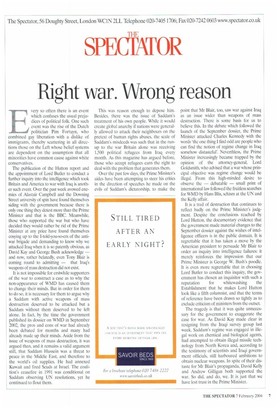Right war. Wron
reason
Every so often there is an event which confuses the usual prejudices of political folk. One such event was the rise of the Dutch politician Pim Fortuyn, who combined gay liberation with a dislike of immigrants, thereby scattering in all directions those on the Left whose belief systems are dependent on the assumption that all minorities have common cause against white conservatives.
The publication of the Hutton report and the appointment of Lord Butler to conduct a further inquiry into the intelligence which took Britain and America to war with Iraq is another such event. Over the past week avowed enemies of Alastair Campbell and the Downing Street university of spin have found themselves siding with the government because there is only one thing they detest more than the Prime Minister and that is the BBC. Meanwhile, those who supported the war but who have decided they would rather be rid of the Prime Minister at any price have found themselves cosying up to the I-told-you-so-ers of the antiwar brigade and demanding to know why we attacked Iraq when it is so patently obvious, as David Kay and George Bush acknowledge — and now, rather belatedly, even Tony Blair is coming round to admitting — that Iraq's weapons of mass destruction did not exist, It is not impossible for erstwhile supporters of the war to construct a case as to why the non-appearance of WMD has caused them to change their minds. But in order for them to do so, it is necessary for them to argue why a Saddam with active weapons of mass destruction deserved to be attacked but a Saddam without them deserved to be left alone. In fact, by the time the government published its dossier on WMD in September 2002, the pros and cons of war had already been debated for months and many had already made up their minds. Aside from the issue of weapons of mass destruction, it was argued then, and it remains a valid argument still, that Saddam Hussein was a threat to peace in the Middle East, and therefore to the world's oil supplies. He had annexed Kuwait and fired Scuds at Israel. The coalition's ceasefire in 1991 was conditional on Saddam observing UN resolutions, yet he continued to flout them. This was reason enough to depose him. Besides, there was the issue of Saddam's treatment of his own people. While it would create global anarchy if nations were generally allowed to attack their neighbours on the pretext of human rights abuses, the scale of Saddam's misdeeds was such that in the runup to the war Britain alone was receiving 1,500 political refugees from Iraq every month. As this magazine has argued before, those who accept refugees earn the right to deal with the problem that generates them.
Over the past few days, the Prime Minister's aides have been attempting to steer his critics in the direction of speeches he made on the evils of Saddam's dictatorship, to make the point that Mr Blair, too, saw war against Iraq as an issue wider than weapons of mass destruction. There is some basis for us to believe this. In the debate which followed the launch of the September dossier, the Prime Minister attacked Charles Kennedy with the words the one thing I find odd are people who can find the notion of regime change in Iraq somehow distasteful'. Neverthless, the Prime Minister increasingly became trapped by the opinion of the attorney-general, Lord Goldsmith, who advised that a war whose principal objective was regime change would be illegal. From this high-minded desire to observe the — debatable — small print of international law followed the fruitless searches for WMD by Hans Blix, schism at the UN and the Kelly affair.
It is a trail of destruction that continues to reflect badly on the Prime Minister's judgment. Despite the conclusions reached by Lord Hutton, the documentary evidence that the government made material changes to the September dossier against the wishes of intelligence officers is in the public domain. It is regrettable that it has taken a move by the American president to persuade Mr Blair to order an inquiry into intelligence failures: it merely reinforces the impression that our Prime Minister is George W. Bush's poodle. It is even more regrettable that in choosing Lord Butler to conduct this inquiry, the government has chosen an inquisitor with such a reputation for whitewashing the Establishment that he makes Lord Hutton look like a fifth columnist, and that the terms of reference have been drawn so tightly as to exclude criticism of ministers from the outset.
The tragedy is that it was quite unnecessary for the government to exaggerate the case for war. As David Kay made clear in resigning from the Iraqi survey group last week, Saddam's regime was engaged in illegal work on chemical and biological agents, had attempted to obtain illegal missile technology from North Korea and, according to the testimony of scientists and Iraqi government officials, still harboured ambitions to obtain nuclear weapons. In spite of their distaste for Mr Blair's propaganda, David Kelly and Andrew Gilligan both supported the war, So did, and do, we. It is just that we have lost trust in the Prime Minister.


























































 Previous page
Previous page